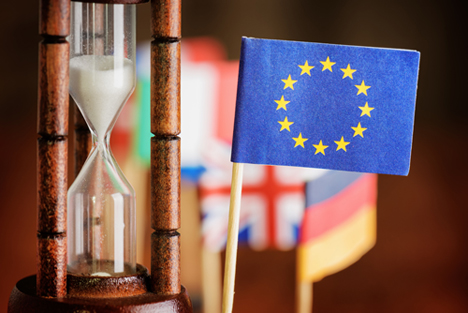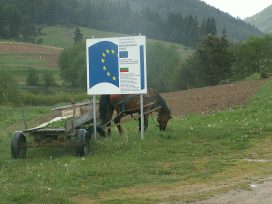
Radical reform is needed to make Europe’s agricultural sector financially sustainable and environmentally resilient. Yet Europe’s biggest farming lobby, together with the EPP, opposes any policy inimical to the interests of large landowners.
History is replete with examples of how the political logic of disintegration sets in. But is the European Union next in line? You can be sure that it is, writes Ivan Krastev, so long as the European project remains a haven for elites over which people have no control.
One of the main plots of the storyline of the current European debate is that we are too Eurocentric to understand that we cannot explain ourselves to others. The Ukrainian conflict is a perfect illustration here – as it is viewed in a totally different way inside and outside Europe. Clearly, the current crisis in Europe, which has been taking place for seven years now, is very different to other crises that have taken place in the world. I remember when the crisis began in 2008. In a conversation with José Manuel Barroso, the then president of the European Commission, he asked us analysts and experts a straightforward question: “What can you do for us?” My response was also straightforward: “Not much”, I said honestly.

Photo: Efired. Source:Shutterstock
I am not a specialist on integration. I am an expert, however, on disintegration. I know how things collapse; this is what I have been studying all my life. I was working on the Balkans and I know how they collapsed, and before that I studied how the Soviet Union had collapsed. That is why what I said to Barrosso was: “What we can offer you is a project on the political logic of disintegration”.
As a result, for almost two years at the Institute for Human Sciences in Vienna, we held seminars and conversations. We invited historians and politicians to participate with us in discussions focused on different examples of disintegration, including that of the Hapsburg Empire, the Soviet Union and Yugoslavia.
Three major themes emerged from these discussions that are critical to understanding the current crisis in Europe. The first is the fact of the unforeseen collapse. Let us not forget that even a year or two before the collapse of the Soviet Union such an event was perceived as unthinkable. Consider a senior panel of Pentagon experts, gathering the most experienced authorities on the Soviet Union in December 1990, which declared the chance of the Soviet Union collapsing was around 20 per cent. In a similar vein, the communists claimed that due to the very strong level of interdependence, the demise of the USSR was not possible and would not make sense. As later events have shown, many things that do not make economic sense often do happen.
To put this point another way: part of the problem that we have today is that we take the European Union for granted. The more we do this, the higher the risk of its disintegration. The belief that something cannot collapse leads to high-risk behaviour.
The second theme that came out of the discussions in Vienna was that disintegration was always the result of an internal cause. And while indeed the anti-integration bloc never prevails over a pro-integration one (even in the case of the Soviet Union a majority wanted the Soviet Union to persist), it is a certain type of political dynamism that is created and starts to develop a logic of its own. It is this logic that begins to build and nurture itself within society.
The third feature that emerged from our discussions was an observation that big projects do not collapse from the periphery. Hence, Bulgaria or Greece will not disintegrate the European Union, no matter how hard they try. Disintegration takes place from the centre. It starts to take place when the winners begin to get the feeling that they are the losers in the project. This is why Poland is such an important country for many in Europe. If Poland, which is often perceived as one of the biggest winners of European integration, starts to have second thoughts about the EU project, then other countries, including Germany, would themselves start to question the project.
Yet this does not mean that the European elite needs to force an “identity” on its people. By doing so, it forces a synthetic structure into society, one that is not real and will not take hold. In Europe, nevertheless, there have already been several attempts made to create a European identity similar to a “national” one. However, these attempts have failed and will continue to fail. There will always be divisions in Europe, such as in the case of the 2003 Iraq war when Europe was divided between its East and West; or now with the crisis in Ukraine. This time Europe is divided between the North and the South. The latter is not interested in having Europe turn into an anti-Putin project. This sentiment has emerged not because there is a great affinity for Vladimir Putin in the southern half of Europe, but because they do not believe it is so important for Europe. The southern states are much more concerned with the immigration crisis than Putin’s proxy armies in a localized area in Ukraine.
I do believe, however, that the Ukrainian crisis will lead to identity building in Europe. But it will not be an identity building of Europeans, rather of Ukrainians. We can see that a new Ukrainian nation is being born. Unfortunately, this is an identity-building opportunity for Russia as well. We will start to see a new, more extreme Russian national identity emerge as a result of the crisis and the propaganda that is being pumped by the Kremlin to its citizens.
On the European level, a new paradox has also emerged as a result of both the European crisis and the situation in Ukraine. In recent years we have witnessed the Europeanization of broad policies while we see an emergence of a renewed national sentiment on the nation-state level. Citizens across Europe are beginning to feel frustrated with the EU. You can see how solidarity and borders can be redrawn. Germans are not ready to do for the Greeks what they did for East Germans in the 1990s. What is more, Germany’s approach to Greece was not a decision of one government or one party; there was a general consensus in Germany towards Greece. And this sentiment is not limited to Germany, but most of the EU states as well.
In his 1992 book The European Rescue of the Nation State, British economic historian Alan Milward argued against the thesis that European integration would break up the nation-state. Indeed, European integration re-legitimized the nation-states. Since one of the outcomes of the Second World War was the collapse of the nation-state, integration brought back legitimacy to these nation-states. This was generally the case since about ten years ago with the success of European integration in Central Europe, which highlights the fact that many of the problems that we face today are not a result of failure, but a result of success. This is why it is so difficult to respond to these problems.
As a result of European integration, we see regional identities emerge and put pressure on the nation-state, such as in Scotland or Catalonia. The Catalans, for example, said that as they were fine being a part of the European Union, why should they be a part of Spain? This was also the Scottish attitude. These are the moments when the nation-states, for the first time, were being challenged by the success of European integration.
Perhaps most importantly, there is a new trend that is developing in Europe – a rebellion against the elite. In my opinion, this rebellion represents the biggest challenge that Europe faces today. This type of anti-elite sentiment is becoming stronger and stronger and there is no clear positive agenda of what those who rebel really want. It is clear, however, that perpetuating the status quo will only make this group angrier. We can see a consequence of this in many recent European elections where protest votes are widespread.
This rebellion can also be seen in the waves of protests that have swept over Europe in the last several years. Therefore, the worst thing that can happen to the European project is if it becomes framed as a project of the European elite. We can expect an even stronger rebellion if the EU ceases to be a project about Europe and becomes a project for its elite. Then an attack on the elite will be an attack that can destroy the whole European project. This is despite the fact that people on the streets are not necessarily anti-European; in a way they are the most European-minded generation that we have had.
In 2013 we had two major protest waves in Bulgaria. First in February, where hundreds of thousands of people in the countryside, organized via social media with no political party or trade union involved, protested against the outrageously high price of electricity. These people camping on the streets did not demand the resignation of the government, but merely wanted a reduction in prices. The movement did not have leaders. They had no clear political message and sang patriotic songs from the nineteenth century. Their biggest issue was related to big companies from Austria or the Czech Republic – the major electricity providers. The message to the elite, which could be seen as quite nationalist, was: “We are Bulgarian, just like you. Why aren’t you taking care of us?”
In June 2013 there was another wave of protests that was much more centred on Sofia. This protest was against the seemingly unimaginable appointment of Delyan Peevski, a Bulgarian oligarch, to head the Bulgarian security agency. Hundreds of thousands of people once again came out to the streets with no political party or trade union affiliation. The protesters carried EU flags and demanded to be treated like Europeans. But when comparing these two protests, it would be wrong to say that there are two Bulgarias (one pro-EU and one more nationalist). In fact many of those involved in the first protests were also involved in the second one. Both Europe and nationalism became a way for the people to seek accountability on the side of the elite. Both of the protests had the same basic feeling – that perhaps we are now freer than before, but we have lost power over our elite.
From this point of view, the best chance that the EU has for success is when the people see it as an instrument to gain control over the elite and not as a haven for the elite. If it becomes the latter, we will see an even greater level of frustration between the elite and the people. This is the lesson that Europe’s leaders need to understand today. If this lesson is not learnt, we will see the disintegration of the project in the future.
Published 18 September 2015
Original in English
First published by New Eastern Europe 5/2015
Contributed by New Eastern Europe © Ivan Krastev / New Eastern Europe / Eurozine
PDF/PRINTSubscribe to know what’s worth thinking about.

Radical reform is needed to make Europe’s agricultural sector financially sustainable and environmentally resilient. Yet Europe’s biggest farming lobby, together with the EPP, opposes any policy inimical to the interests of large landowners.

Ukraine’s EU candidacy has brought new momentum to an EU enlargement process suffering from a major crisis of credibility. But reservations towards enlargement run deep. The EU should admit this and propose an interim goal that still offers candidate countries genuine incentive for reform.